Login
Latest Code Ticker for Visual Basic.
Daily Code Email
|
|
Recommended readings for:
Beginning VB Programmers
Intermediate VB Programmers
Advanced VB Programmers
For
Beginning VB Programmers
Rating
(4 planets out of 5) |
Learn to
Program with Visual Basic
by John Smiley
Fantastic training for programming newbies related in an intresting and
conversational style. |
Purchase
 |
I have
to admit that I approached this book with skepticism. In his summary of this book,
the author claims that he believs that he can teach anyone to program. I've seen too
many books that fall short of this lofty goal, but within just a few minutes of picking up
this book, I became a convert.
This book is less like a programming manual and more like
a novel. In an interesting and refreshingly different style, Smiley teaches the
reader programming development skills using an unusual conceit. Narrating from the
first person, he tells the story of how he and the students in his Visual Basic class
developed an application for the Bullina China shop. Doing so, they 'coincidentally'
learn the in's and out's of developing programs in Visual Basic!
Don't be fooled by the fact that this book is a narrative, into
thinking that it couldn't possibly cover anything substantial. Quite the
opposite is true, because by the time the reader is finished, he or she will have
progressed from a completely cluless amateur to having a very solid grasp of programming
fundamentals.
The book also comes with a complete working version of Microsoft
Visual Basic 6 Working Model Edition and is very reasonably priced. I heartily
recommend it. |
Rating
(3 planets out of 5) |
Step by Step
Microsoft Visual Basic 6
by Microsoft Press
Solid hands-on instruction for the complete programming neophyte. |
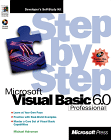
Purchase
 |
If you
have experience programming in other computer languages, this book will be a little too
slow for you. However, if you have absolutely never programmed before in your entire
life and are looking for a book that is easy to understand and takes you through
programming using a step-by-step approach, this is a good book.
The book is as hands-on
as every beginner's book should be. After the first few chapters you'll already be
using Visual Basic to create simple programs. More advanced structured programming
concepts such as FOR NEXT loops, variables, and IF-THEN processing follow in the next few
chapters. By the end of the book, you'll be able to write fairly sophisticated
programs that display multiple dialog boxes and access input via databases or text files.
If you are looking to
cut your programming teeth on VB, this book is a solid choice. |
For
Intermediate VB Programmers
learning Object Oriented Development
Rating
(4 planets out of 5) |
Beginning
Objects with Visual Basic 6
by Peter WrightA thorough tour de force on object oriented design and programming
fundamentals. |
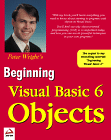
Purchase
 |
You are familiar with VB, and structured programming, and maybe you are so good that you
can almost create apps in your sleep. But you keep hearing about object-oriented
programming...supposedly you can cut your development time with it, and create more
reliable apps. You know the features are all built into VB, but nothing in the VB
tutorials lay out exactly how it should be done. What do you do?
If you fall into this situation, this book is the perfect
answer for you. Wright takes you from designing objects using the basics of Unified
Modeling Language (UML) to actual object implementation (using classes) to creating
reusable components (ActiveX servers and controls). He uses easy to read language
and an engaging conversational style.
I have read quite a few
books on Object Oriented Programming, but for learning OO fundamentals, I have not read
any books better than this one. |
Rating
(4 planets out of 5) |
Visual Basic
Source Code Library
by Brian Shea et al.
Planet Source Code on the go! |
Purchase
 |
Ever wish you could get to Planet Source Code while you're
away from the Internet? If so, this book is the next best thing to connecting
online! Frequest visitors of Planet Source Code will recognize the names of the many
co-authors of this book, because they are mostly Planet Source Code contributors!
(including yours truly)
This book is an invaluable resource with hundreds of pages
of raw source code, collected from all over the world. The source code ranges from
string parsing routines to managing Windows NT PDC groups and users. This book is
easily worth it's weight in gold!
...And lest you think I'm just pushing my own book, you
should know that neither myself nor any of the other authors get any royalties from this
book...we've already been paid.
|
For Advanced VB Programmers
Rating
(4 planets out of 5) |
MTS and MSMQ
Wrox Professional Series
Great in-depth summary of using MTS and MSMQ. |
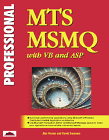
|
Personally, I feel that the
Microsoft Trasaction Server product has some serious flaws. The lack of handling of
state-full objects breaks the object-oriented paradigm, making it cumbersome to utilize in
object oriented apps. Add to that the lack of implentation of resource sharing in
this version of MTS, and the result is a package that (to me) adds little real value to
any OO project. However, if you purchase this book, you are probably already
committed to this technology and have only one requirement--you need to understand how to
use it...fast.
If you fall into this category or are implementing
Microsoft Message Queue (which I DO recommend) to create a fault tolerant system, I
heartily recommend this book.
Microsoft is promoting their Distributed interNet
Architecture (DNA) as a platform for developing fully distributed applications, but they
don't seem to be having to much success at getting DNA adopted. The fault lies in trying
to push DNA as a solution in itself, rather that pushing the ideas that make it good,
i.e.:n-tier client/server applications, Client transparency, Distributed applications,
etec.
The core of DNA is the use of business objects in
a middle tier of the application, and this is 'supported' by two new technologies:
Microsoft Transaction Server (MTS), which is a component manager offering full transaction
support; and Microsoft Message Queue Server (MSMQ), which provides the fault-tolerance
required in distributed application. Together, these make it simple to build into the DNA
dream.
This book gets straight down to basics, introducing the
concept of DNA and showing it in action. It allows developers to grasp the whole structure
of distributed and web-based applications, and then see how the various parts and built
and how they interact. There is also a case study around which the book is
organized, giving a logical progression through the principles and implementation of the
design, development, and final result.
If you're serious about using MSMQ and MTS, then this book is for you. |
Rating
(5 planets out of 5) |
Building
Object Applications That Work
by Scott W. Ambler, Richard S. Wiener
Absolutley brilliant tutorial on creating Object Oriented Systems. |
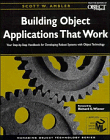
Purchase

|
All of the books in the Planet
Source Code 'recommended readings' are best-of-breed tomes. However, I am not
exagerating in any way when I say that this book blows every other book I've read in the
past 2 years completely away.
Let me first warn you that this book is NOT
a Visual Basic oriented book--it is an OO book. So if you still get confused when
you hear the word 'method' instead of 'sub' or 'function', or if you think
'inheritance' only refers to how much you can expect to receive from your favorite aunt
when she dies, you are probably not ready for this one yet. However, if you have a
solid understanding of OO concepts and the experience to match, then this book can take
your object designs, frameworks and implentations from the advanced level into the
rarified air of the top 10% of all OO system designers and builders.
Am I gushing about this book? I
probably am, but I feel it deserves it. A reviewer from Amazon.com echoes my
sentiment when he says, " When it comes to actually designing and
implementing object technology, the second volume of Ambler's trilogy is undoubtedly the
best book so far in the software development business."
If you're a frequent reader of OO texts, you'll find that
most are more like religious treatises on the benefits of OO, rather than pragmatic
instruction on how to build real-world systems. This book strikes a defiant stand
against that trend. From topics like 'How to build an A-class object framework' to
'Constructing superior diagrams', to "How to persist objects', this book delivers
invaluable information that would take a new OO developer years to discover on his/her
own.
If there is anything bad to say about this book, it is that
occasionally the reader is forced to endure a little bit more of Ambler's ego than would
be desired. (Let's put it this way...the guy created his own modeling notation and
named it after himself) However, in a genre where egos seem to run more rampant than
rednecks do in the country-side, Ambler is hardly the worst offender (...right away, Booch
comes to mind right away as being much worse...).
So to summarize, this book is fantastic, and I
heartily recommend it. It will help almost every developer do his/her job much
better than they are now.
|
Rating
(3 1/2 planets out of 5) |
Visual Basic 6
Business Objects
by Rocky Lhotka
Thorough tutorial on enterprise-wide and n-tier system design using VB. |
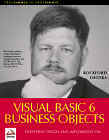
Purchase

|
Enterprise-wide and
n-tier system design is the hottest rage now. But even many experienced developers
find it difficult to sort through and tackle all of the design issues required to
implement a successful n-tier system. Even more programmers are confused as to why
n-tier systems are even necessary. If you fall into either of these categories, this
book is an absolute must read. The author assumes an understanding of basic object
oriented concepts, so if you are new to or uncomfortable with OO programming concepts, a
better book to start with would be Beginning
Objects with Visual Basic 6. However, if you have a rudimentary foundation in
OO, Lhotka presents all of the information that you need to take your apps from the
single-user level to the Enterprise level, in a simple and easy-to-read writing style.
Lhotka
starts his book with a history lesson on traditional 2 tier systems (also called client
server systems), explains their limitations and shows why Enterprise-wide applications
could not be built on such a framework. He then goes on to explain exactly what an
n-tier system is, and how separating out the business-logic from an application GUI can
result in increased code reuse and dramatically reduce development time.
While concepts are great, the
devil is always in the details. Here Lhotka comes through well by actually providing
working code which substantiate his ideas. Since n-tier GUI clients have the
flexibility of being implemented in many ways, Lhotka demonstrates how to create GUI
clients in VB, Excel, and even on the Internet using Visual Interdev and Active Server
Pages (ASP). He also gives sample code of a traditional 2-tier database system, a
3-tier system using Distributed Component Object Model (DCOM) object an an application
server, and a 3-tier system using Microsoft Transaction Server (MTS)...so the reader can
appreciate the differences between them.
If you are serious
about learning the basics of building Enterprise wide n-tier applications, then I heartily
recommend this book. |
Brought to you
|

